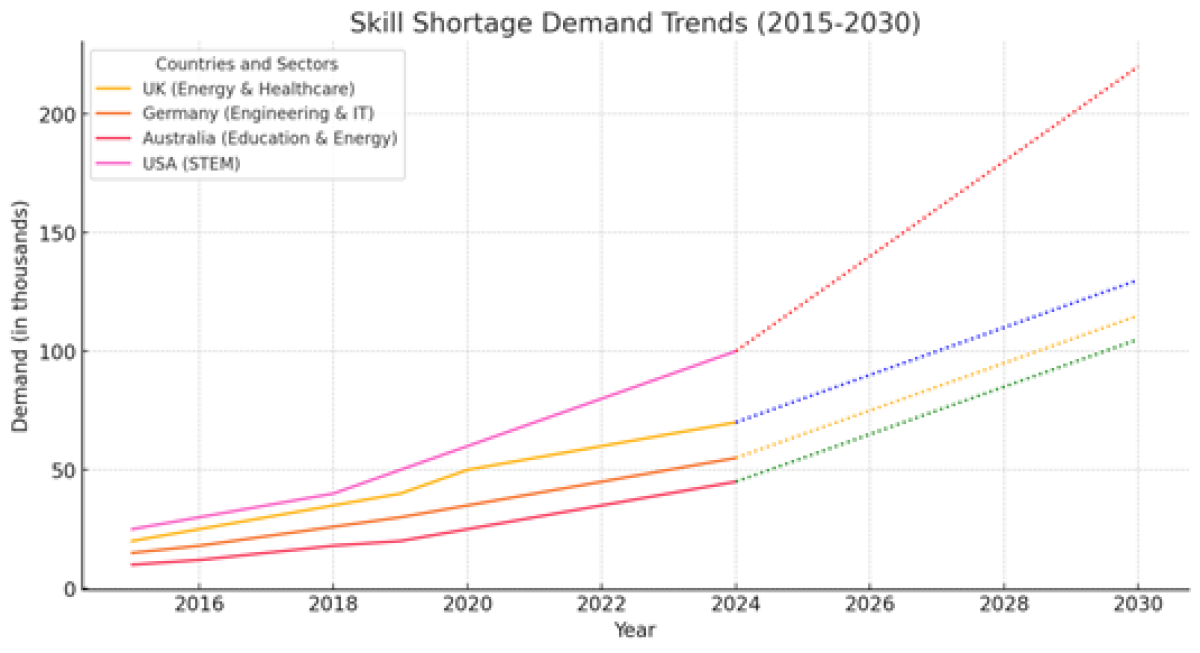

Millions of Skilled Workers Required to Fill Global Skill Shortage Gaps by 2030
Millions of Skilled Workers Required to Fill Global Skill Shortage Gaps by 2030
The global economy is undergoing a seismic shift, fueled by technological disruption, demographic changes, and a growing urgency to address climate change. These forces are creating unprecedented demand for specialized skills, leading to critical shortages in key sectors worldwide. This report delves beyond the headlines, analyzing data from national labor statistics, industry reports, and academic research to identify which countries will face the most acute skill shortages from 2025 onwards.
Why Skill Shortages Are Rising Globally Despite AI and Technology
Skill shortages arise from several interconnected factors:
- Technological Advancements: Emerging fields like artificial intelligence (AI) and renewable energy require specialized expertise.
- Aging Populations: Developed nations, particularly Germany and Japan, face shrinking workforces due to aging populations.
- Global Health Crises: The pandemic has heightened the demand for healthcare professionals.
- Decarbonization Goals: Transitioning to green energy has spiked the need for skilled labor in energy sectors
Projected Skill Shortage Trends and Forecast
Infographic: Skill Shortage Demand Trends (2015-2030)
A graph showcasing increasing demand for skilled workers across key sectors in the UK, Germany, Australia, and the USA. Solid lines represent historical data (2015-2024), while dotted lines project trends up to 2030.
-
Sectors Facing Acute Skill Shortages
United Kingdom
Opportunities are concentrated in renewable energy, healthcare, and construction.
- The UK faces a projected 100,000+ vacancies in the energy sector as it strives to meet decarbonization targets.
- An aging population is driving a growing need for healthcare professionals.
Solutions:
- The Shortage Occupation List offers fast-track visa programs for skilled workers.
- Family-friendly policies allow work visa holders to bring their families, who can also work, alongside competitive salaries.
Germany
The greatest needs lie in engineering, construction, and IT.
- By 2025, over 200,000 positions in these fields are expected to remain unfilled.
Solutions:
- The Blue Card program attracts highly skilled non-EU workers, offering family reunification options.
Australia
Australia’s focus is on renewable energy, education, and healthcare.
- Over 10,000 roles are anticipated in clean energy projects.
- A projected 4,000+ teacher vacancies are expected by 2025.
Solutions:
- The Global Talent Visa Program prioritizes skilled migrants in high-demand industries.
- Regional migration schemes encourage workers to settle in less populated areas.
- Work visas allow spouses to work and children to access quality education, making Australia a family-friendly destination.
Global Healthcare Sector
The healthcare sector faces an acute shortage, with the World Health Organization predicting a shortfall of 10 million health workers by 2030. Africa and Southeast Asia are the most affected regions.
Solutions:
- WHO Fellowship Programs enable professionals to upskill and secure placements in high-need areas.
- Cross-border recruitment agreements in countries like the UK and Australia actively seek international healthcare workers.
STEM Fields
Countries such as the USA, UK, Germany, and Japan are experiencing increasing deficits in STEM fields.
- The USA expects a shortfall of 2.1 to 3.5 million STEM/manufacturing sector workers by 2025.
- High demand exists for AI specialists, data scientists, and software engineers.
Solutions:
- Programs like the H-1B Visa in the USA facilitate immigration for specialized workers, often allowing dependents to join.
- High salaries and opportunities for research and innovation make STEM fields particularly attractive.
How AMOZA Overseas Recruitment Can Help
AMOZA Overseas Recruitment, with three decades of expertise in bulk recruitment, is well-positioned to address global skill shortages. Specializing in connecting skilled professionals with international opportunities, AMOZA bridges the gap between high-demand sectors and talented workers.
Key Services Offered by AMOZA:
- Targeted Recruitment: AMOZA identifies and matches professionals to roles in industries such as renewable energy, healthcare, STEM, and construction.
- Streamlined Processes: With in-depth knowledge of international visa programs and immigration policies, AMOZA simplifies the hiring process for both employers and candidates.
- End-to-End Support: From pre-departure training to post-placement assistance, AMOZA ensures a smooth transition for overseas workers.
- Family-Friendly Options: AMOZA provides guidance on family reunification policies, enabling professionals to bring their loved ones along.
With a strong track record of successful placements, AMOZA Overseas Recruitment is a trusted partner for employers and skilled workers alike. By leveraging AMOZA’s expertise, countries and industries can address critical labor shortages while offering professionals fulfilling global career opportunities.
Conclusion
Global skill shortages are a pressing issue, requiring coordinated efforts from governments, industries, and educational institutions. By understanding the root causes and implementing targeted solutions, countries can address these gaps and create opportunities for millions of skilled workers worldwide. For professionals, these trends highlight the importance of upskilling and exploring international opportunities in high-demand sectors.

